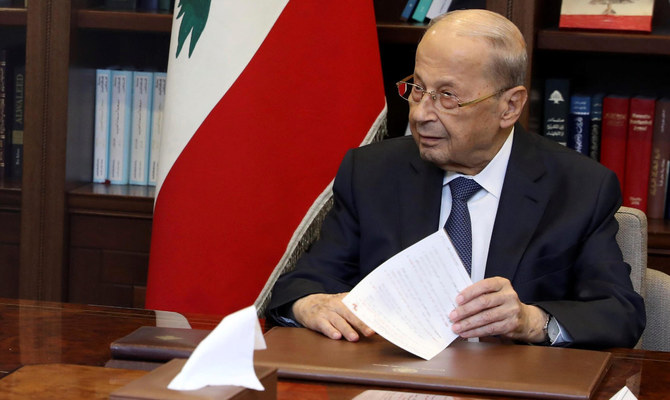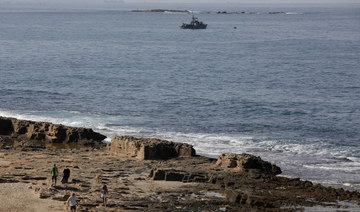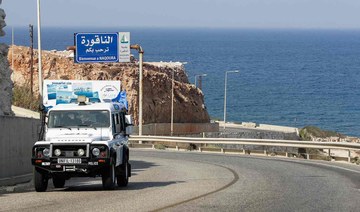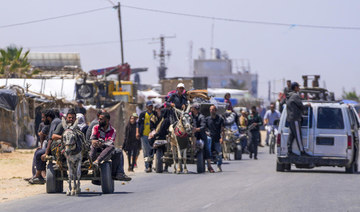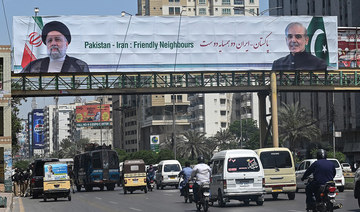BEIRUT: Lebanese President Michel Aoun welcomed the US-brokered maritime border deal with Israel on Wednesday, saying it will “pull Lebanon out of the abyss,” in reference to his country’s three-year economic crisis.
Lebanon and Israel signaled their approval on Tuesday to the deal laying out their respective maritime rights.
A parliamentary debate has already taken place on the necessary steps to bring the agreement into force.
Some MPs demanded that the agreement be presented to parliament after the negotiations were conducted in secrecy, saying that the deal is related to “national rights that concern the state and the people.”
Former Prime Minister Fouad Siniora said: “In 2009, Lebanon demarcated its borders in the southern exclusive economic zone and the demarcation was submitted to the UN. At that time, Israel hadn’t demarcated its exclusive economic zone and only did so two years after Lebanon’s border demarcation.
“Subsequently, Israel developed the fields affiliated to it in the region, while Lebanon was dealing with bargains and populism. This made the country waste 13 years, leading to the situation we are in now.”
Forces of Change MP Michel Douaihy expressed concern over the agreement as he feared “the same disastrous consequences that we are currently dealing with and that brought the country extreme poverty, widespread unemployment, aggravated migration and poor public services.”
The Kataeb Party said that “Hezbollah and its allies negotiated the agreement without informing the representatives of the Lebanese people of its content.”
The Lebanese president, prime minister and parliamentary speaker confirmed that the country had been granted all the demands and amendments requested regarding the Qana field. They added that no partnerships were concluded between Lebanon and Israel and that there would not be any direct wealth-sharing between the parties.
They said Israel will receive compensation for the proportion of the Qana field that extends beyond Line 23 through the region of the French company Total.
Israeli Prime Minister Yair Lapid discussed the agreement with his Cabinet before forwarding its details to the Knesset.
Indirect negotiations between Lebanon and Israel, through American mediation, lasted two years and Lebanon has acquired a disputed maritime area of 860 square kilometers.
US President Joe Biden congratulated Aoun on the deal. He said: “It's just the beginning. The negotiations were difficult and will contribute to improving the lives of millions of people in Lebanon. They required a lot of courage.
“The agreement is an opportunity to return and restore foreign investments in Lebanon, which you desperately need. Implementing the agreement in good faith is essential and plays a key role in achieving success. We are always available to assist you and we will make sure Israel abides by all its obligations under this agreement.”
Biden said he hoped presidential elections will produce a government capable of restoring the confidence of Lebanese people and one that can carry out necessary economic and political reforms.
Biden issued a statement later saying that “energy – particularly in the Eastern Mediterranean – should serve as the tool for cooperation, stability, security and prosperity, not for conflict."
EU External Affairs Commissioner Josep Borrell and British Ambassador to Lebanon Hamish Cowell also welcomed the deal.
The US State Department called it “a wonderful diplomatic achievement. It inaugurates a new era of regional cooperation and enhances prosperity, security and stability.”
The UAE Ministry of Foreign Affairs and International Cooperation hoped that “this step will contribute to strengthening the stability of the region.”
Hezbollah chief Hassan Nasrallah said his party was “behind the state and hoped that the prospective agreement will contribute to achieving economic improvement.”
Nasrallah expressed his surprise over Hezbollah being accused of wanting to sabotage the deal as he said the party was a “facilitator.”



